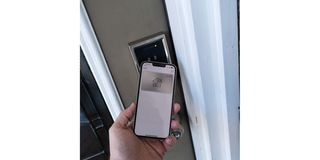Prime
Secure your home with a smart lock

Many smart locks can function at a basic level using short-range Bluetooth to grant keyless entry. PHOTO | COURTESY
What you need to know:
- For sheer convenience and peace of mind that come with a smart lock, this is an upgrade that is hard to beat and unlikely to disappoint.
The lock and key concept that has served us well for centuries is finally getting an upgrade. With the smart home revolution, you can now lock or unlock your door remotely using a wireless network technology such as Wi-Fi or Bluetooth and your smartphone, whether manually through an app or automatically when your phone is detected in close proximity.
There are two types of smart locks on the market; the smart lock that you place on your current lock and the smart lock model that replaces it altogether. Whether you want a simple design such as a smart doorknob or a futuristic one such as keyless entry smart locks, you have a wide range of styles to choose. Choose a model that looks like a traditional deadbolt or whatever else appeals to your personal aesthetics.
Both types of locks use smart home technology and home automation such as an app, a personal identification number (PIN) or a fingerprint. All smart locks use wireless and energy-efficient technology.
Who needs a smart lock?
Smart locks are ideal for those who rent their properties out on short-term rental platforms such as Airbnb. With a decent smart lock system installed, you can grant temporary or conditional entry to customers.
Smart locks are an excellent option for those who have mobility issues. This includes the elderly, those with Parkinson’s disease or cerebral palsy, individuals who have an arthritic condition, and those who have repetitive motion injuries, like carpal tunnel and tennis elbow, that make twisting the wrist and hand difficult.
If you share a house with other housemates, whose schedules clash, the smart lock is an ideal solution. Instead of having to leave keys with neighbours or hide it inside a flower pot just give out access codes to your housemates.
Handing out duplicate keys to neighbors and hiding them in your yard can leave you open to burglaries if someone accidentally finds a key and decides to act unscrupulous. It also means that your lock is harder to pick, especially if you purchase smart locks without visible keyholes.
Considerations
Before you jump on the smart lock trend, there are some things you need to put into consideration.
First and most important is that you should look a lock that is safely tested and certified. Because not every smart lock scores the same when it comes to security.
Secondly, ensure that all the other products you need for a smart lock are easily available. For example, to be able to open your lock remotely - in addition to Bluetooth - you need Wi-Fi, which is reliable. If you live with young children and older adults for whom any form of technology is a challenge, get a smart lock that comes with clicker, which will them to open and close the door with the push of a button.
How does it work?
It depends on the smart lock brand and type, but a common feature of most smart locks is the ability to lock and unlock your door using your smartphone. Once installed, you will be able to open the related app and press a button on screen to operate your door.
Many smart locks will be on the lookout for your phone, so when you get close to your door it will unlock automatically. You can also set them to lock automatically when you leave your house, or when the door has been left unlocked for a certain period of time.
Power
While some smart locks require wiring into the mains, the best smart lock systems are powered by AA batteries. These will generally last between six months to a year, depending on the extent of your usage.
When these batteries start running out, most will let you know through a smartphone notification. They may also let you know through a visual indication (such as a flashing light) on the lock itself.
Moving house
Because most smart locks work with existing fittings, you should simply be able to replace any elements of your old lock and take your smart lock to your new home. Be sure to keep your old door handle components in safe storage for this very reason.
What if I have no Wi-Fi?
Many smart locks can function at a basic level without Wi-Fi, using short-range Bluetooth or NFC connectivity to grant keyless entry.
However, more advanced smart locks will offer the option of adding a so-called Wi-Fi bridge, which is a device that plugs into a wall socket and connects your smart lock to your Wi-Fi. With one of these, you can control your door lock from literally anywhere in the world.
If the internet connection or electricity goes out at your home, or if your phone gets lost, locking and unlocking the door is tricky. Many smart lock models come with a physical key, which you should always carry along.




